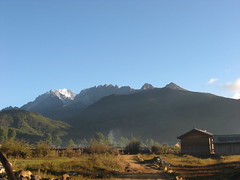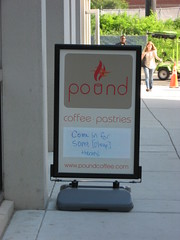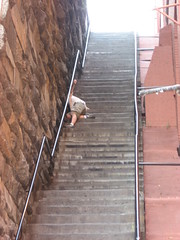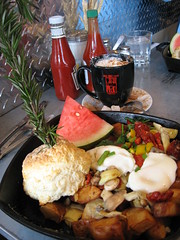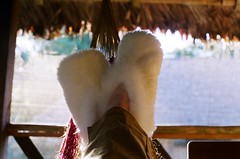I got a reasonably early start on the 8th, though I was slowed by some difficulty finding breakfast. I was determined not to eat in my hostel, on the grounds that it was overpriced, smokey, and too backpacker-y. But the coffee shop I found wasn't open yet, and street food just wasn't as ubiquitous as I'd expected. So... I settled for toast and scrambled eggs in the hostel next door, which turned out to be much prettier than mine. At least my quest led me through a strip of park that runs along the outside of the city wall, where early risers were socializing and exercising.
After breakfast I ascended the city wall at the South Gate and rented a rickety bike, then jounced in a rectangle around the central part of town. It's an impressive wall in terms of size, condition, and pretty sentry buildings and watch towers, but once you've seen one strip of it, you've seen it all. It was interesting to get a look at the slums, since I'd only seen the nicer parts of Xi'an to that point.
I used all 100 minutes of my bike rental to get all the way around (it was a long wall, and a rickety bike), then got a taxi to the town's big, ancient mosque. It was a very Chinese-looking mosque complex, and though it looked to be in good condition it had a dusty patina, which I liked. I was disappointed that only worshipers were allowed in the prayer hall, though I understood it.
Short on time, I stopped at several tiny shops in the Muslim quarter for provisions: several pieces of bread, some unidentified fruit, a preserved egg, pastries. I got a taxi back to the hostel, collected my backpack, and took a taxi to the train station.
Yes, I took a lot of taxis in China. It's lazy, but it's hard to justify trying to brave the bus system when someone will drive me where I want to go for a little over a dollar. I am on vacation. But taxis don't solve every problem: The drivers don't speak English, have never heard of my hostel, and didn't understand it I try to tell them the address. A Lonely Planet map (with street names in pinyin and characters) means nothing to them. So I coped by telling them a landmark near where I want to go, then walking. Eventually I started painstakingly copying addresses from Lonely Planet onto a small piece of paper, which they seemed to understand better than my spoken Chinese.
The 16-hour train ride was uneventful and fairly comfortable, with one scenic mountainous stretch before it got dark. I think there was meat in one of the pastries I'd bought, but the others were good. The dried fruit turned out to be crabapples, I thought--I couldn't remember ever having eaten a crabapple, so I couldn't be sure. The preserved egg tasted ok, but looked black and gelatinous and had a chemical smell. When I got to the yolk it was slimy, and I actually gagged. I threw the rest away.
I woke up sometime after 4:00 am and found the other three passengers from my compartment gone. I worried that I'd missed Chengdu, and stayed awake to make sure I wouldn't, if I hadn't already. In fact the conductor would have woken me up; she'd collected my ticket earlier, carefully folded it three ways, and pu7t it in a pocket in a book, handing me a plastic rectangle with my car and compartment numbers. This ritual was repeated in reverse shortly before arrival.
Showing posts with label breakfast. Show all posts
Showing posts with label breakfast. Show all posts
Sunday, April 05, 2009
Sunday, February 22, 2009
Wenhai
I woke up early to the sounds of a cat crying insistently and of a German tourist telling the hostel worker her plans. Leaving my window open had been a mistake.
I gave up sleeping eventually, and showered and packed. The woman who worked there was no longer in the courtyard when I came out. No one had asked me for money the night before or even my passport, but no matter--Mama's Naxi Guesthouse was actually three guesthouses, and breakfast was served at a different one. I had a banana pancake there, actually a large piece of flat fried bread covered in sliced bananas, and paid for both the pancake and the room.
I was supposed to meet Cun Xuerong, the ecolodge manager, at 10:00 at a water wheel on the other side of the Old Town. My experience the night before had taught me that the Old Town is very difficult to navigate for the uninitiated, but miraculously, I arrived at 10:00 exactly. Mr. Cun, a handsome 30-something man with an urban air, found me quickly. He doesn't speak English, it turned out. I expressed surprise, since the emails from Wenhai had been signed with his name, but he said someone else had written them. The woman I'd talked to on the phone, surely.
We managed to communicate surprisingly well in Chinese, though. Perhaps Mr. Cun is used to talking to foreigners with a weak grasp of the language. Was I American? Yes. Was I working in China? I'd learned the word for "work" but forgotten it. I looked it up, then told him I didn't have a job in China, but was a tourist. Where had I studied Chinese, then? In college. Mr. Cun seemed pleasantly surprised to hear that colleges in America offer Chinese. He asked whether the instructors were Chinese or American. I said they were Chinese. It was by far the most successful conversation I'd had in Mandarin since arriving in the country.
Mr. Cun drove me in his Jeep to the foot of a mountain, where we waited for the guide and horse(s) to arrive. When I'd asked for the horse option I'd optimistically expected a guide on a horse, a horse for me, and perhaps a third animal for luggage, but now I worriedly watched a middle-aged man lead one small, dark, slightly mud-speckled horse out of the woods. Mr. Cun introduced me to Mr. He and told me to put my backpack on and mount the horse, which I did with some difficulty. The saddle was what I assumed to be the Naxi traditional style, unpadded with a hard loop of a handle in front.
I didn't particularly like being the tourist led along on a horse, but on our way up the mountain we saw Han tourists doing it too, and one middle-aged waiguoren couple. The path was steep, and the horse had to stop periodically to catch its breath. It wasn't long before my knees were stiff, my backside was sore, and I wished I were walking.
Mr. He is perhaps about 40, and small. He wore a battered sport coat, corduroys, and shoes resembling soccer cleats, plus a backpack with the vegetables Mr. Cun had bought for my meals. He didn't talk much.
We passed a dam, then a small reservoir. We crested the pass and soon afterward Mr. He suggested that I walk for the next stretch, which was particularly steep. I did so gladly, although my knees were so stiff I could barely walk at first. My dismount was no more graceful than my mount--I wasn't feeling like much of a martial artist.
Further down he had me get back on the horse, which moved away as I did. I joked that he didn't like me, but it wasn't really a joke.
As we neared the village we began to pass Naxi who weren't leading tourists on horses. Mr. He talked to all of them in a staccato language. We arrived at around 1:00, and Mrs. He cooked me lunch. It was simple and excellent: one plate of tomatoes and scrambled eggs, another of mushrooms and garlic, plus, of course, rice from a giant cooker.
But it soon began to seem to me that there was something off about the ecolodge. Mr. Cun had told me, when I asked him, that there were no other guests at the moment, and I hadn't expected luxury accommodations. but I had expected some sort of orientation. The Hes spoke no English, and the English-speaking woman I'd spoken to on the phone was nowhere in evidence. I'd have settled for a printout suggesting things to do, or even a patient explanation in Chinese and sign language, but it seemed that once I'd been shown my room and fed, I was on my own. Also, there was a distinct atmosphere of neglect: Huge cobwebs in the bathroom and hallways, plastic bottles piled under the stairs, and a receipt left in my room from the Grand Lijiang Hotel dating from early September.
Yet there was ample evidence that much care had gone into this place at one time. In the common room, where I ate, a sign announces that the lodge had been launched with funds from the Nature Conservancy and the Japanese government. The Nature Conservancy wanted to foster sustainable tourism in China to benefit the environment, and the Japanese wanted to show their friendship and help the people of Wenhai. Big framed posters, now dirty and faded, declaim in Chinese and flawless English on the philosophy of ecotourism, life in Wenhai, and regional flora and fauna. There are clipped articles on the lodge from the travel sections of the Daily Telegraph, the Far Eastern Economic Review, and the New York Times. These last two were both written in 2004 by the same freelancer, Craig Simmons. The articles sunnily describe the beauty of the setting, the difficulty of reaching the lodge, and its ecological amenities, which include solar panels, a biogas system, and a greenhouse. I wondered whether any of these were still working.
It was only 2:00, so I decided to do a little exploring. On my way out Mrs. He asked where I was going, and I answered truthfully that I didn't know. Perhaps I should have tried to provide more information.
I ambled around Wenhai Lake, which I'd learned is a seasonal lake, although I'm not quite clear on when it disappears. The only wildlife I spotted was a toad, but there were more free-roaming domestic animals than I'd ever seen before in one place: pigs, chickens, dogs, horses, cattle. I even saw some yaks, the first I'd ever seen outside of a zoo. The lake, the tiny streams that feed it, and the mountains--especially Jade Dragon Snow Mountain--made for some beautiful views. Time seem to melt away: Every time I looked at my watch, another hour had elapsed.
I got back to the ecolodge as it was growing dark, and Mrs. He served me three dishes this time, plus the ubiquitous tea (with a huge thermos for refills). As I was eating Mrs. He came in and handed me a cell phone. It was the English-speaking woman I'd talked to the day before. I don't know what she sounds like in Chinese or Naxi, but in English she comes across as strident.
"Hello? How are you?" with preliminaries out of the way, she asked me what I planned to do the next day. I said I didn't know. She told me I could walk around the lake and village by myself, but to go further afield I would need a guide. I didn't argue about that. She said that my options for the next day included climbing a mountain or walking to some Yi villages. Weighing this, I asked how far away the villages were. "Two are close, but two are farther away. But if you get tired you can just tell the guide, he'll take you home." I asked how difficult the climb up the mountain was. "If you get tired, I think you can tell Xiao He "hui jia," or you can speak to him in English, because he has guided many foreigners and I think maybe he understand you." This response seemed unecessarily patronizing--of course I could tell Mr. He "hui jia"--but if could communicate so well with the Hes, why was she calling me? I said I'd like to visit the Yi villages, and handed the phone back to Mrs. He.
The temperature dropped quickly after sundown, and the lodge was unheated, so I headed upstairs soon after dinner, taking the massive thermos with me. Next to my room was a door to the roof, and I went out. Here were the famous solar panels, or two of them anyway. One had a towel drying on it. On the wall were what appeared to be the panels' control or monitoring devices, but their digital displays were dark. Just to the side of the roof was a greenhouse I'd read about on an informative poster in the bathroom. In addition to nurturing vegetables, it was supposed to keep the biogas digester warm in winter so that it would keep working. But its clear plastic roof was almost entirely torn away, and the floor had been reclaimed by weeds.
I was sitting in bed reading about the Naxi in Lonely Planet when Mrs. He knocked at the door. I found her very difficult to understand. She asked whether I had a question or problem. I said no. She said something about the phone call. I tried to say yes, the woman on the phone and I talked about my going to the Yi villages tomorrow. She asked me something that I didn't understand. She said never mind, go back to sleep. Confused, I went back to bed.
I gave up sleeping eventually, and showered and packed. The woman who worked there was no longer in the courtyard when I came out. No one had asked me for money the night before or even my passport, but no matter--Mama's Naxi Guesthouse was actually three guesthouses, and breakfast was served at a different one. I had a banana pancake there, actually a large piece of flat fried bread covered in sliced bananas, and paid for both the pancake and the room.
I was supposed to meet Cun Xuerong, the ecolodge manager, at 10:00 at a water wheel on the other side of the Old Town. My experience the night before had taught me that the Old Town is very difficult to navigate for the uninitiated, but miraculously, I arrived at 10:00 exactly. Mr. Cun, a handsome 30-something man with an urban air, found me quickly. He doesn't speak English, it turned out. I expressed surprise, since the emails from Wenhai had been signed with his name, but he said someone else had written them. The woman I'd talked to on the phone, surely.
We managed to communicate surprisingly well in Chinese, though. Perhaps Mr. Cun is used to talking to foreigners with a weak grasp of the language. Was I American? Yes. Was I working in China? I'd learned the word for "work" but forgotten it. I looked it up, then told him I didn't have a job in China, but was a tourist. Where had I studied Chinese, then? In college. Mr. Cun seemed pleasantly surprised to hear that colleges in America offer Chinese. He asked whether the instructors were Chinese or American. I said they were Chinese. It was by far the most successful conversation I'd had in Mandarin since arriving in the country.
Mr. Cun drove me in his Jeep to the foot of a mountain, where we waited for the guide and horse(s) to arrive. When I'd asked for the horse option I'd optimistically expected a guide on a horse, a horse for me, and perhaps a third animal for luggage, but now I worriedly watched a middle-aged man lead one small, dark, slightly mud-speckled horse out of the woods. Mr. Cun introduced me to Mr. He and told me to put my backpack on and mount the horse, which I did with some difficulty. The saddle was what I assumed to be the Naxi traditional style, unpadded with a hard loop of a handle in front.
I didn't particularly like being the tourist led along on a horse, but on our way up the mountain we saw Han tourists doing it too, and one middle-aged waiguoren couple. The path was steep, and the horse had to stop periodically to catch its breath. It wasn't long before my knees were stiff, my backside was sore, and I wished I were walking.
Mr. He is perhaps about 40, and small. He wore a battered sport coat, corduroys, and shoes resembling soccer cleats, plus a backpack with the vegetables Mr. Cun had bought for my meals. He didn't talk much.
We passed a dam, then a small reservoir. We crested the pass and soon afterward Mr. He suggested that I walk for the next stretch, which was particularly steep. I did so gladly, although my knees were so stiff I could barely walk at first. My dismount was no more graceful than my mount--I wasn't feeling like much of a martial artist.
Further down he had me get back on the horse, which moved away as I did. I joked that he didn't like me, but it wasn't really a joke.
As we neared the village we began to pass Naxi who weren't leading tourists on horses. Mr. He talked to all of them in a staccato language. We arrived at around 1:00, and Mrs. He cooked me lunch. It was simple and excellent: one plate of tomatoes and scrambled eggs, another of mushrooms and garlic, plus, of course, rice from a giant cooker.
But it soon began to seem to me that there was something off about the ecolodge. Mr. Cun had told me, when I asked him, that there were no other guests at the moment, and I hadn't expected luxury accommodations. but I had expected some sort of orientation. The Hes spoke no English, and the English-speaking woman I'd spoken to on the phone was nowhere in evidence. I'd have settled for a printout suggesting things to do, or even a patient explanation in Chinese and sign language, but it seemed that once I'd been shown my room and fed, I was on my own. Also, there was a distinct atmosphere of neglect: Huge cobwebs in the bathroom and hallways, plastic bottles piled under the stairs, and a receipt left in my room from the Grand Lijiang Hotel dating from early September.
Yet there was ample evidence that much care had gone into this place at one time. In the common room, where I ate, a sign announces that the lodge had been launched with funds from the Nature Conservancy and the Japanese government. The Nature Conservancy wanted to foster sustainable tourism in China to benefit the environment, and the Japanese wanted to show their friendship and help the people of Wenhai. Big framed posters, now dirty and faded, declaim in Chinese and flawless English on the philosophy of ecotourism, life in Wenhai, and regional flora and fauna. There are clipped articles on the lodge from the travel sections of the Daily Telegraph, the Far Eastern Economic Review, and the New York Times. These last two were both written in 2004 by the same freelancer, Craig Simmons. The articles sunnily describe the beauty of the setting, the difficulty of reaching the lodge, and its ecological amenities, which include solar panels, a biogas system, and a greenhouse. I wondered whether any of these were still working.
It was only 2:00, so I decided to do a little exploring. On my way out Mrs. He asked where I was going, and I answered truthfully that I didn't know. Perhaps I should have tried to provide more information.
I ambled around Wenhai Lake, which I'd learned is a seasonal lake, although I'm not quite clear on when it disappears. The only wildlife I spotted was a toad, but there were more free-roaming domestic animals than I'd ever seen before in one place: pigs, chickens, dogs, horses, cattle. I even saw some yaks, the first I'd ever seen outside of a zoo. The lake, the tiny streams that feed it, and the mountains--especially Jade Dragon Snow Mountain--made for some beautiful views. Time seem to melt away: Every time I looked at my watch, another hour had elapsed.
I got back to the ecolodge as it was growing dark, and Mrs. He served me three dishes this time, plus the ubiquitous tea (with a huge thermos for refills). As I was eating Mrs. He came in and handed me a cell phone. It was the English-speaking woman I'd talked to the day before. I don't know what she sounds like in Chinese or Naxi, but in English she comes across as strident.
"Hello? How are you?" with preliminaries out of the way, she asked me what I planned to do the next day. I said I didn't know. She told me I could walk around the lake and village by myself, but to go further afield I would need a guide. I didn't argue about that. She said that my options for the next day included climbing a mountain or walking to some Yi villages. Weighing this, I asked how far away the villages were. "Two are close, but two are farther away. But if you get tired you can just tell the guide, he'll take you home." I asked how difficult the climb up the mountain was. "If you get tired, I think you can tell Xiao He "hui jia," or you can speak to him in English, because he has guided many foreigners and I think maybe he understand you." This response seemed unecessarily patronizing--of course I could tell Mr. He "hui jia"--but if could communicate so well with the Hes, why was she calling me? I said I'd like to visit the Yi villages, and handed the phone back to Mrs. He.
The temperature dropped quickly after sundown, and the lodge was unheated, so I headed upstairs soon after dinner, taking the massive thermos with me. Next to my room was a door to the roof, and I went out. Here were the famous solar panels, or two of them anyway. One had a towel drying on it. On the wall were what appeared to be the panels' control or monitoring devices, but their digital displays were dark. Just to the side of the roof was a greenhouse I'd read about on an informative poster in the bathroom. In addition to nurturing vegetables, it was supposed to keep the biogas digester warm in winter so that it would keep working. But its clear plastic roof was almost entirely torn away, and the floor had been reclaimed by weeds.
I was sitting in bed reading about the Naxi in Lonely Planet when Mrs. He knocked at the door. I found her very difficult to understand. She asked whether I had a question or problem. I said no. She said something about the phone call. I tried to say yes, the woman on the phone and I talked about my going to the Yi villages tomorrow. She asked me something that I didn't understand. She said never mind, go back to sleep. Confused, I went back to bed.
Tuesday, August 12, 2008
Local flavor
I pass this coffee shop every day on my way to the Metro, and it's always got some quirky message for me, usually ending in an exclamation mark. One of my favorites: "We have cupcakes!" Lately they seem to be less about advertising specific Pound offerings, though, and more philosophical. One day it was "A powerful city deserves powerful coffee!", and yesterday, "Waking up and facing Monday beats the alternative" -- would that be considered existentialist?
Sadly, I've never actually gone in to Pound. I'm not much of a coffee drinker, and even if I were, Metro doesn't allow drinks. And the place closes in mid-afternoon, so I can't stop in on my way home. I suspect Pound caters mainly to ATF agents, construction workers, and XM employees. No wonder they're quirky.
Sadly, I've never actually gone in to Pound. I'm not much of a coffee drinker, and even if I were, Metro doesn't allow drinks. And the place closes in mid-afternoon, so I can't stop in on my way home. I suspect Pound caters mainly to ATF agents, construction workers, and XM employees. No wonder they're quirky.
Friday, July 27, 2007
In which the Virgin performs a miracle
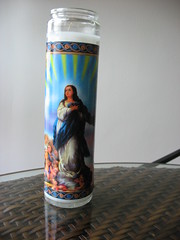 On Friday night those of us who had never been to A Day in Rock City before were awarded Virgin candles from the Mexican store.
On Friday night those of us who had never been to A Day in Rock City before were awarded Virgin candles from the Mexican store.On Tuesday I was late to the airport. I'm somewhat notorious for being late to the airport; when leaving from DC I arrived 50 minutes before takeoff. But I had the impression that it took 45 minutes to get from Niffer-bur's to O'Hare on the El; in fact, it took an hour. A very long hour, involving many stops and much inching along. I hadn't had anything to eat that day, and given my love of breakfast, by the time I got to O'Hare I was quite irritable and worried. More than missing my flight, I was worried about not having time to grab a bite to eat before boarding.
I arrived about 40 minutes before takeoff and speed-walked through the airport to security, which I found wondrously line-free. Relievedly, I took off my shoes, put my bag on the conveyor belt, and heard those dreaded words: "bag check!"
I searched my conscience and, hoping for quick redemption, confessed my sins to the middle-aged TSA employee assigned to my bag: "I know, I forgot to take my liquids out."
"Which pocket are they in?"
I pointed to the front pocket, where he found my carefully-packed quart-sized zip-top bag of quasi-contrabands.
"It looked like you had a spray can or a bottle..." he said, replacing the baggie.
I thought, and realized what it must be. If he searched the packed main compartment of my bag, it would take forever. But I felt calm, resigned to my fate of missing my flight. "I have a candle," I said.
"You have a candle?" he said, handing my bag over. "Ok, thank you."
I took my bag slowly, unable to believe this stroke of luck. As I hoisted it onto my back and headed through the terminal, I glanced at the clock: still enough time to hit the bathroom and a fast-food joint. I was saved.
Tuesday, June 19, 2007
Tourists III
These are the kinds of food we ate this past weekend:
Afghani
French
sandwich (Potbelly, such a hit we went back the next day)
Ethiopian
Turkish (ok, only so E97 had the Turkish breakfast, but I'm counting it)
sushi
I also introduced Joey to the wonder that is the mojito.
On Sunday afternoon Joey and E97 walked up the Exorcist stairs in Georgetown. Then Joey pretended to fall down them. Then they raced back up them. I had to stay at the bottom because, well, that was just the sacrifice I had to make in order to record the whole ordeal.
Afghani
French
sandwich (Potbelly, such a hit we went back the next day)
Ethiopian
Turkish (ok, only so E97 had the Turkish breakfast, but I'm counting it)
sushi
I also introduced Joey to the wonder that is the mojito.
On Sunday afternoon Joey and E97 walked up the Exorcist stairs in Georgetown. Then Joey pretended to fall down them. Then they raced back up them. I had to stay at the bottom because, well, that was just the sacrifice I had to make in order to record the whole ordeal.
Wednesday, May 02, 2007
Now that's a breakfast
Breakfast (or brunch) is my favorite meal of the day to eat out for. There's something very decadent about being able to go to a restaurant for breakfast: It's a signal to myself and the rest of the world that, hey, I don't have anyplace to rush off to. I can go out for breakfast. At 11:00.
So, although I took plenty of pictures at the wedding I went to this past weekend in San Diego, and at the beach, and even a few (technically) in Mexico, it's this one I'll share. Because this, readers, is an exciting breakfast. In the foreground is a hash of potatoes, artichoke hearts, sundried tomatoes, and mushrooms, topped with two poached eggs. In the background is an espresso drink called a cinnamon bun a go-go.
So, although I took plenty of pictures at the wedding I went to this past weekend in San Diego, and at the beach, and even a few (technically) in Mexico, it's this one I'll share. Because this, readers, is an exciting breakfast. In the foreground is a hash of potatoes, artichoke hearts, sundried tomatoes, and mushrooms, topped with two poached eggs. In the background is an espresso drink called a cinnamon bun a go-go.
Subscribe to:
Posts (Atom)

